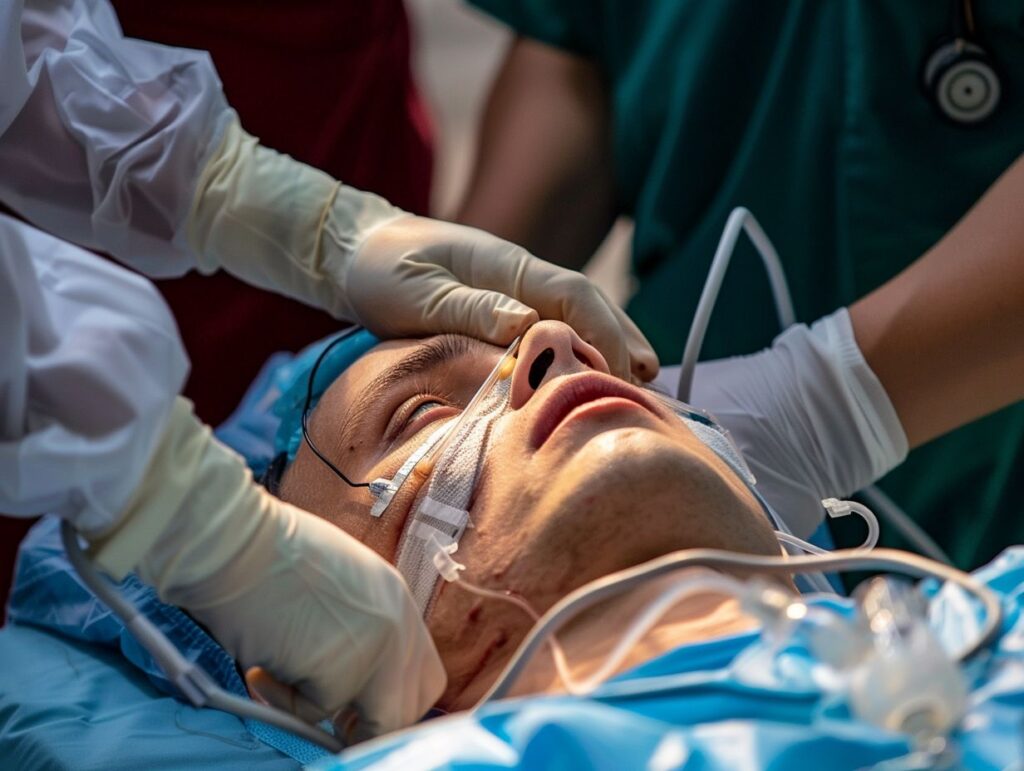If you’ve been involved in a motorcycle accident in Florida, it’s important to know the steps to take to protect yourself and your rights.
This article will guide you through the process of handling motorcycle accident claims, from seeking medical attention to handling communication with insurance companies.
We’ll discuss common causes of motorcycle accidents in Florida, types of damages you can claim, and provide tips on how to navigate the insurance claim process.
Stay informed and prepared in case you find yourself in this unfortunate situation.
What Are the Steps to Take After a Motorcycle Accident?

Following a motorcycle accident in Florida, it is important to adhere to a set of procedures to safeguard your rights and pursue potential compensation for personal injury and damages. These steps typically involve:
- Contacting law enforcement
- Collecting information at the scene
- Seeking guidance from a knowledgeable motorcycle attorney
1. Seek Medical Attention
After a motorcycle accident, the first step to take is to seek immediate medical attention, even if there are no apparent serious injuries.
This medical evaluation is important for both health and well-being and is also significant for any potential personal injury claim. Seeking medical treatment helps create a record of injuries, treatment plans, and associated costs, which are crucial in building a solid case for compensation. These medical bills and records act as concrete evidence to substantiate the claim, showing the extent of injuries and the financial impact on one’s life.
Therefore, it is essential to prioritize prompt medical attention after an accident to safeguard rights and support any future legal actions.
2. Gather Evidence at the Scene
Collecting evidence at the scene of a motorcycle accident is crucial for establishing a solid case for compensation. It is important to gather a range of information to back your claim for damages. This may involve capturing photos of the accident location, the vehicles involved, and any visible injuries sustained.
Obtaining detailed witness statements can offer valuable testimonies of the incident. Contact information of witnesses and parties involved should also be obtained to aid in future inquiries. All these forms of documentation can assist in illustrating the series of events and confirming liability, which is essential in pursuing suitable compensation for any physical, emotional, or financial damages suffered.
3. File a Police Report
Submitting a police report is an essential step following a motorcycle accident, as it establishes an official record of the incident.
To file a police report, individuals should initially reach out to the local authorities or go to the nearest police station. They should provide information such as the date, time, and location of the accident, as well as a narrative of the events that occurred. It is important to include details about any injuries sustained, damage to vehicles or property, and the contact information of witnesses.
Having an official report not only aids in legal procedures but also facilitates insurance claims. Insurance companies frequently request a copy of the police report to handle claims efficiently and determine liability in an accident.
4. Contact Your Insurance Company
Following a motorcycle accident, individuals should reach out to their insurance company to notify them of the incident and begin the claims procedure. Essential information, including the accident date, time, location, and details of other vehicles involved, should be provided to the insurance provider. Any injuries sustained during the accident should also be reported.
Personal Injury Protection (PIP) insurance coverage is important as it can help cover initial medical expenses, such as hospital bills and rehabilitation costs. This coverage offers financial assistance regardless of fault, providing reassurance during a difficult period.
What Are the Common Causes of Motorcycle Accidents in Florida?
Motorcycle accidents in Florida can be caused by a variety of factors that may compromise the safety of both motorcycle riders and other motorists on the road.
1. Distracted Driving

Distracted driving is a significant contributing factor to motorcycle accidents, often stemming from drivers using mobile devices or engaging in other inattentive behaviors.
This dangerous trend has serious implications, with data indicating that around 60% of motorcycle accidents involving another vehicle can be attributed to driver distraction.
Motorcyclists face particularly severe consequences in these situations due to their lack of protection compared to car occupants. The risk to motorcyclists is heightened by distracted drivers who neglect to check blind spots or maintain a safe following distance.
Addressing this issue requires the implementation of awareness campaigns, stricter enforcement of laws, and the development of technology to reduce distractions while driving, all of which are crucial steps in improving motorcycle safety.
2. Lane Splitting
Lane splitting, where a motorcycle rider navigates between lanes of slow-moving or stopped traffic, is a practice that can lead to serious accidents in Florida.
In Florida, the legal status of lane splitting is not explicitly defined, which creates ambiguity for riders and other motorists.
Due to the lack of specific regulations, motorcycle riders engaging in lane splitting may face legal consequences if deemed to be driving recklessly. The risks involved with lane splitting include the potential for collisions with other vehicles, reduced reaction time, and decreased visibility to surrounding drivers.
To minimize these risks, it is imperative for motorcycle riders to always prioritize safety by staying alert, maintaining a safe distance from other vehicles, using turn signals, and wearing appropriate safety gear such as helmets and reflective clothing.
3. Speeding
Exceeding the speed limit significantly raises the probability of motorcycle accidents as it diminishes the rider’s reaction time and their capacity to navigate safely. When motorcyclists surpass the recommended speed limits, not only do they jeopardize their safety, but they also put other road users at risk.
According to data from the National Highway Traffic Safety Administration (NHTSA), speeding played a role in more than 30% of fatal motorcycle accidents. To prevent becoming part of this statistic, bikers should always obey posted speed limits, especially in congested areas or adverse weather conditions. It is essential to maintain a safe distance from other vehicles and be aware of blind spots.
By incorporating defensive driving techniques and adhering to speed limits, riders can significantly decrease the likelihood of being in a collision.
4. Drunk Driving
Drunk driving significantly contributes to motorcycle accidents, posing a severe risk to both the impaired rider and others on the road. This reckless behavior not only endangers lives but also results in serious legal consequences for individuals caught driving under the influence.
Statistics indicate that a significant percentage of traffic accidents involve alcohol, emphasizing the pressing need for effective prevention strategies. One key approach is to raise awareness about the dangers of drunk driving through educational campaigns and public service announcements.
Implementing strict penalties for offenders, such as license suspension and fines, can act as a deterrent and assist in lowering the occurrence of alcohol-related accidents.
What Are the Types of Damages You Can Claim in a Motorcycle Accident?
In case of a motorcycle accident, individuals may have the right to claim different kinds of damages to obtain fair compensation for their losses.
1. Medical Expenses
Medical expenses may accrue swiftly following a motorcycle accident, encompassing various aspects from emergency care to ongoing treatments.
Surgeries typically represent a substantial portion of these expenses, particularly if multiple procedures are necessary. Expenses associated with medications for pain relief and recuperation can swiftly accumulate over time. Rehabilitation services, like physical therapy and counseling, are essential for a patient’s recovery but may also be costly.
Maintaining thorough records of all these expenses, inclusive of invoices, receipts, and insurance statements, is vital to substantiate any claims for compensation or reimbursement.
2. Lost Wages

Lost wages are an important aspect of compensation claims, encompassing the income that was missed during the recovery period from a motorcycle accident.
Calculating lost wages involves determining the income that would have been earned while unable to work due to the accident. This calculation can be based on the hourly rate or salary.
To substantiate the claim, it is crucial to collect documentation like pay stubs, tax returns, and employer verification of the time off. A personal injury attorney can help navigate the legal procedures, ensuring that the claim for lost wages is properly documented and supported.
3. Pain and Suffering
Compensation for pain and suffering aims to address the physical and emotional distress resulting from a motorcycle accident. When evaluating pain and suffering in these situations, various factors are considered. These may encompass the severity of the injuries, the length of the recovery period, and the effects on the person’s overall quality of life.
Legal representation is essential for collecting evidence and constructing a strong argument to support the compensation claims. Skilled attorneys are proficient in determining the suitable compensation amount for pain and suffering, guaranteeing that their clients are fairly and equitably recompensed for the suffering they have experienced.
4. Property Damage
Property damage claims cover the costs of repairing or replacing a motorcycle and any other personal property damaged in an accident. When filing a property damage claim, it is important to gather evidence such as photos of the damaged property, repair estimates, and relevant receipts to support the value of the items. This evidence helps substantiate the extent of the damage and aids in assessing the claim.
Once all necessary documentation is collected, it can be submitted to the insurance provider or the at-fault party’s insurance company for review. Property damage claims are crucial in the compensation process, aiming to restore damaged property to its pre-accident condition and provide financial reimbursement for the losses incurred.
How to Handle Communication with Insurance Companies?
Managing communication with insurance companies following a motorcycle accident necessitates meticulous attention to detail and comprehension of your insurance obligations.
1. Be Honest and Accurate
When communicating with insurance companies, honesty and accuracy are crucial in statements to ensure a fair assessment of claims.
Providing precise information is key in the claims process. Misrepresentation or inaccuracies can cause delays or even claim denial. Insurance companies depend on the provided information to evaluate the claim’s validity and decide on coverage.
Inaccurate details could lead to settlements that do not fully compensate for the losses. Therefore, by maintaining transparency and truthfulness in communication, individuals enhance the likelihood of a successful claim and establish trust with their insurer for future dealings.
2. Do Not Accept a Low Settlement Offer
It is advised not to accept a low settlement offer from an insurance company without thoroughly evaluating the full extent of your damages and consulting with a legal expert.
Initial settlement offers from insurance companies often aim to minimize the compensation deserved. It’s crucial to understand that these offers may not cover all expenses, including medical bills, lost wages, and emotional distress.
Evaluating the true value of claims is essential to ensure adequate compensation for suffering and losses. Engaging in negotiations with the insurance company or their representatives can work towards securing a fair settlement that reflects actual damages incurred. Skilled negotiation can make a significant difference in achieving a just outcome in the case.
3. Seek Legal Advice

Obtaining legal assistance from a motorcycle attorney can assist individuals in navigating the intricacies of insurance claims and ensuring they receive fair compensation. An experienced attorney can offer expert advice on the specifics of motorcycle accident cases, aiding in the comprehension of one’s rights and legal alternatives.
Having a proficient lawyer present can provide crucial negotiation assistance when engaging with insurance companies to secure just compensation. Should disputes or legal obstacles arise, the attorney will intervene to advocate for the client’s interests, striving to achieve the most favorable resolution possible.
With their expertise and representation, individuals can have confidence in safeguarding their legal rights and pursuing appropriate remedies.
Frequently Asked Questions
What should I do immediately after a motorcycle accident in Florida?
After ensuring that everyone involved in the accident is safe, you should take photos of the scene, exchange contact and insurance information with the other parties, and call the police to file a report.
Do I need to report the accident to my insurance company?
Yes, it is important to report the accident to your insurance company as soon as possible. Failure to do so may result in your claim being denied.
How long do I have to file a motorcycle accident claim in Florida?
In Florida, the statute of limitations for filing a motorcycle accident claim is four years from the date of the accident. It is important to file your claim within this timeframe to ensure that you are eligible for compensation.
What types of compensation can I receive for a motorcycle accident claim in Florida?
You may be eligible to receive compensation for medical expenses, lost wages, property damage, pain and suffering, and other related costs. It is important to keep detailed records of all expenses related to the accident.
Do I need to hire a lawyer to handle my motorcycle accident claim in Florida?
While it is not required to hire a lawyer, it is highly recommended. A lawyer can help you navigate the complex legal process and ensure that you receive the maximum amount of compensation for your claim.
What if I was partially at fault for the motorcycle accident in Florida?
Florida follows a comparative negligence rule, which means that if you are found to be partially at fault for the accident, your compensation may be reduced. It is important to consult with a lawyer to determine your level of fault and how it may affect your claim.























Rate this article:
Average rating 0 / 5. Vote count: 0
No votes so far! Be the first to rate this post.
No Comments yet!